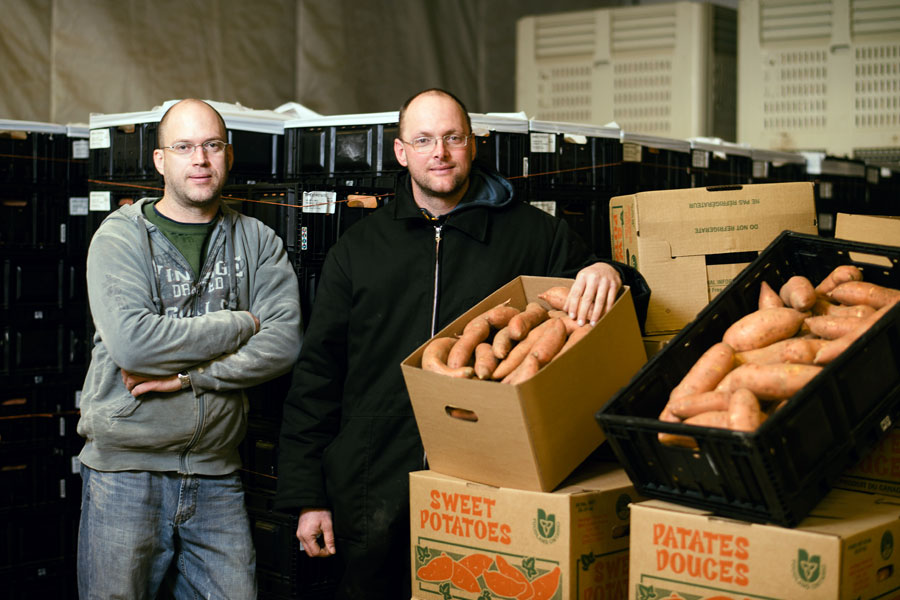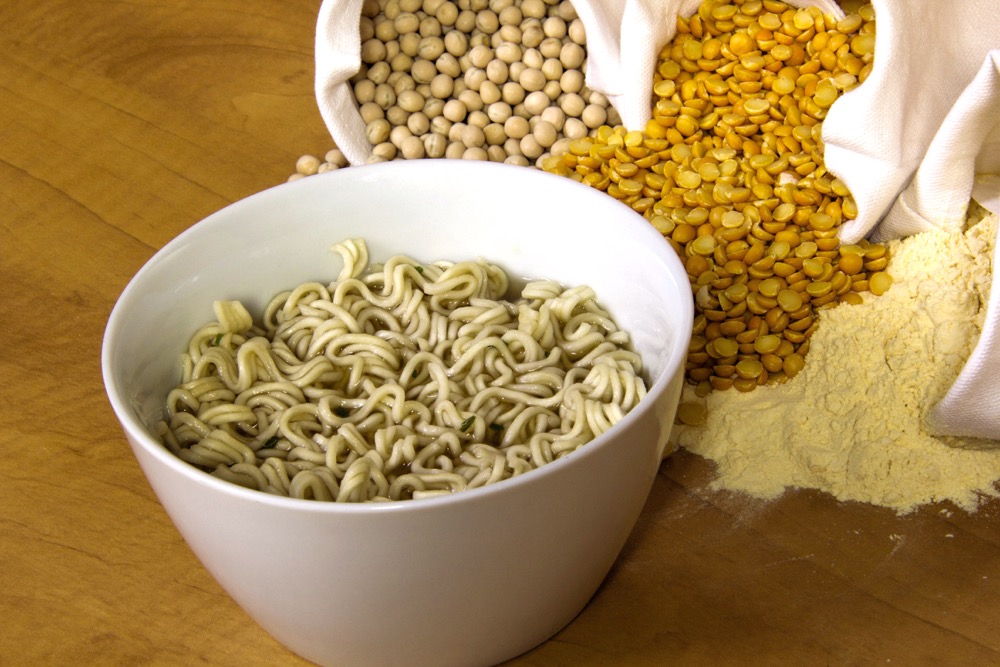When I first crossed paths with John Weninger, it was 2009, and it was because a contact at a food-service company had told me about Weninger’s sweet potatoes. At the time, Weninger had about 40 of his 300 acres in the crop, and he was selling most of his harvest to grocery stores and the food-service sector.
I decided to put the story on hold. The operation looked like a success, but I wasn’t entirely sure what insights there would be in it that would help other Country Guide readers.
Read Also

Riding the tariff rollercoaster
Farmers are accustomed to roller-coaster years. But the current geopolitical windstorm is something else entirely. On his cattle operation near…
After Weninger started talking about adding value to his sweet potato crop using an on-farm mill to grind some of it into flour, however, I scribbled a note to check back in a couple of years.
Now that those couple years have gone by, the story is a bit different than I had expected.
A former tobacco farmer, Weninger farms near Aylmer, Ont., with his brother Joe. They started growing sweet potatoes in 2001 as part of their exit strategy from tobacco. They’re now up to 60 acres of sweet potatoes, which they rotate with corn, soybeans, and spelt. They’ve been out of tobacco going on seven years — and they’re on the lookout for ways to add value so they can continue to work full time on the farm.
The flour isn’t their first value-adding project. Before that, they did a market assessment plus some trials for flash-frozen sweet potato — but decided not to go to market with the idea.
It’s very much a family business, says Weninger, who looks after most of the milling and marketing, while his brother Joe does most of the production work, including farm operations. As in many family businesses, though, nothing is cast in stone. “When it comes to planting, if I have time I’ll be there planting,” Weninger says. Their father John, who is retired, does some field work, while their mother, Angela, often helps make up boxes for sweet potatoes, and the family also hires six or seven seasonal farm workers.
Fast forward to 2014
Today, Weninger is still growing sweet potatoes. “We’re packing sweet potatoes as we speak,” he tells me on the day we talk. He’s still focused on adding value and still makes flour. The difference today, however, is that a lot of the added value isn’t on crops from their own farm.
Opportunity knocked. Now Weninger is using crops from around the world.
The Weningers sell fresh sweet potatoes to Loblaws, independent grocers, and into the food-service industry. They’ve been told their sweet potatoes are sweeter, look more appetizing, and taste better than imported American product. That quality advantage is important, because their acreage is small compared to bigger American growers. “Definitely the ‘buy-local’ has helped the fresh market sweet potato market,” says Weninger as he talks about the relatively small Ontario sweet potato acreage.
“I’m a little boy playing with the big boys,” Weninger says, referring to large grocery chains. Nonetheless, he’s had a good experience working with Loblaws, saying, “You gotta give it to these guys, they’re the only major chain that stands behind the local guys (sweet potato farmers).”
Weninger likes big customers because it means he doesn’t have to deal with the logistics of shipping single skids, as he does with smaller stores. On the flip side, with the majority of his harvest going to one company, he knows that he has most of his eggs in one basket.
Another reason for having a diverse customer base is that not everyone wants the same thing. Food-service companies, he explains, take the jumbo sweet potatoes that are too big for the retail market, using them to make fries. And smaller sweet potatoes are used for flour. “Some of the culls that we produce go into the pet food industry,” he adds.
Weninger used to sell at farmers’ markets — and still has a few farmers’ market vendors who buy his sweet potatoes to resell — but doesn’t sell at markets nowadays. He liked the direct contact with consumers, but it took too much time.
From the Alberta Farmer Express website: Modern farmer finds success with heritage grains
The first steps
It was in looking for ways to add value that six years ago the Weningers started to dry sweet potatoes and grind them into flour. Today, their Beta-Pro flour is marketed as a source of beta-carotene, vitamin A, iron, potassium, and fibre. Plus it is gluten free and can be used to replace a portion of the conventional flour in baking, as a thickening agent in sauces, a binder in hamburger, or added to shakes as a nutritional supplement.
The flour is sold by Bulk Barn across Canada, and is used on a commercial scale by some bakeries. It is also used in a couple of unexpected places, including in brewing, and by a zoo food company that blends it into a feed for crickets (which in turn are fed to reptiles).
As the Weningers grew the sweet potato flour business, they invested in an infrared dehydrator to dry the cubed sweet potatoes before putting them through a hammer mill.
From there, the family branched out into a new business, custom drying other foods.
While only about two per cent of the sweet potato harvest goes into this value-added product, Weninger says it’s a good fit for the operation. “It’s worth it because it complements our line,” he says. Despite lower-priced dry sweet potato from the U.S., he still has a market for his grown-in-Ontario product. “We have customers who want that,” he says.
But the evolution has continued. One of the first things I learn when I check back in with Weninger in 2014 is that the infrared dryer is gone. “We’ve gotten out of the custom-drying business,” he explains. They still sell their Beta-Pro sweet potato flour, and it’s still made with sweet potatoes from their farm. Now, though, they hire out the drying, using a third party.
To Weninger, selling the dehydrator made business sense. It freed up time and money to focus on another value-added business, one that they stumbled upon by accident when peddling flour. While the drying business didn’t grow as much as they hoped it would, it paved the way to a new opportunity.
Beyond what you’d expect
 “We fell into it by accident. We were at a show promoting our sweet potato flour and a vendor came up and said he had a problem with flour from another company,” says Weninger as he talks about getting his first milling order, for a batch of chickpea flour. “It wasn’t exactly what he wanted,” he adds as he talks about his first attempt, which was a bit on the coarse side. A commercial sifting machine was $40,000, so they improvised and made their own. “We just kept milling and sifting, and eventually sent him a product he really liked,” says Weninger.
“We fell into it by accident. We were at a show promoting our sweet potato flour and a vendor came up and said he had a problem with flour from another company,” says Weninger as he talks about getting his first milling order, for a batch of chickpea flour. “It wasn’t exactly what he wanted,” he adds as he talks about his first attempt, which was a bit on the coarse side. A commercial sifting machine was $40,000, so they improvised and made their own. “We just kept milling and sifting, and eventually sent him a product he really liked,” says Weninger.
The growth of their milling business was gradual. “It took us years to get where we are now,” he says. He still dumps grain into the mill hopper manually, bags flour, and stacks skids.
Today, they mill six different grains, also selling starches, sugars, gums, and a couple other gluten-free flours. “Pretty much everything for the gluten-free baking industry we have,” he says. They mill teff and amaranth from overseas, chickpeas and faba bean from Western Canada, millet from the U.S. Midwest, and quinoa from Bolivia. They also sell sorghum and rice flour for gluten-free bakeries’ use.
Along with the hammer mill they already had, they have added a stone mill — and the expensive sifter. “I see a lot of potential in it yet,” says Weninger as he talks about a customer base stretching from British Columbia to Nova Scotia.
Managed growth
Looking back, Weninger says if he were to do things over he might push the milling business more, saying, “I would have marketed myself harder a bit earlier.” He doesn’t regret the cautious approach, however, because they were able to manage the growth as it happened. “It was a slow growth, but it’s something the banks like to see,” he adds.
They recently discontinued most of the small, retail-size flour packages (except for sweet potato flour), focusing instead on industrial-size clients such as bakeries and manufacturers. The priority now, says Weninger, is larger customers.
They are considering setting up another mill in a separate location to mill grains with gluten, such as the spelt they now grow. On the distribution side, they are investigating warehousing options all across Canada. Weninger explains, “Shipping is a major cost of any product.” For specialty products, customers might pay shipping — “but on products available elsewhere, they won’t.”
From flash freezing, to drying, to milling, Weninger isn’t afraid to look at adding value in different ways — forging a worthwhile niche and discontinuing what doesn’t work well. Right now, that means he is rethinking the benefit of selling sugars, which don’t get him much margin. “The flours and the starches are where we’re focusing,” he says.
As for milling things that don’t grow on the farm, Weninger isn’t sentimental. “Most of the stuff wouldn’t grow here in Ontario anyway.”
CORRECTION, July 4, 2014: The original version of this article included an incorrect spelling of the Weninger family name throughout. We regret the error.















